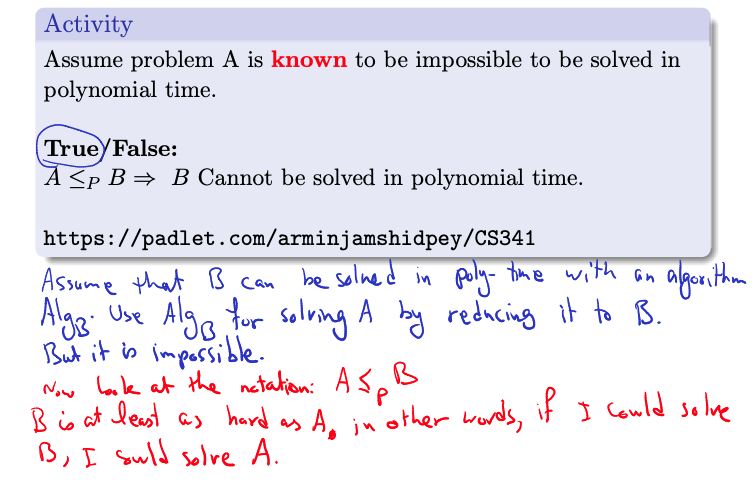NP-Hard
A problem is NP-Hard if every problem reduces to .
- If then
If , then NP-hard problems could not be solved in polynomial time.
Proving Hardness Using Polynomial Reduction

Activity: Assume problem is known to be impossible to be solved in polynomial time. True/False: Cannot be solved in polynomial time.
The answer is True. Assume that can be solved in poly-time with an algorithm. . Use for solving by reducing it to . But it is impossible.
Now look at the notation. . B is at least as hard as A, in other words, if I could solve , I could solve . B is harder to solve.
Summary:
In computational complexity theory, when we say that problem is polynomial-time reducible to problem (denoted as ), it means that we can efficiently transform instances of problem into instances of problem in polynomial time. In essence, this reduction implies that if we could solve problem efficiently (in polynomial time), then we could also solve problem efficiently by first transforming its instances into instances of BB and then using the polynomial-time algorithm for to solve them.
ahhhh
Assumption: Let’s assume that problem is known to be impossible to be solved in polynomial time. This implies that there is no polynomial-time algorithm capable of solving .
Implication: Now, if we have a polynomial-time reduction from to (i.e., ), and we assume that can be solved in polynomial time, it would imply that we could solve in polynomial time as well. This is because we could transform instances of into instances of using the polynomial-time reduction and then solve them using the assumed polynomial-time algorithm for .
Contradiction: However, this contradicts our initial assumption that problem cannot be solved in polynomial time. If cannot be solved in polynomial time, and we have a polynomial-time reduction from to , then also cannot be solved in polynomial time. This is because if were solvable in polynomial time, we would be able to solve in polynomial time, which contradicts our assumption about the hardness of .
Therefore, if problem is polynomial-time reducible to problem and problem is known to be unsolvable in polynomial time, it follows that problem cannot be solved in polynomial time either. This demonstrates how we can use polynomial reductions to infer the hardness of problems and establish relationships between their complexities.